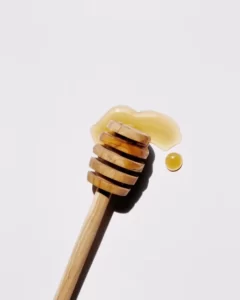Table of Contents
Introduction
Ah, honey. It’s sweet, sticky, and delicious in herbal tea. No wonder why so many call it nature’s candy. But its perks don’t stop at your taste buds. Honey is also full of potential benefits for the skin, which is why it’s often used in makeup and skincare products such as lip balm, moisturizers, and masks.
The Benefits of Eating Honey
When it comes to skin, most studies on honey’s potential uses focus on its topical application, rather than eating it. But what about internally? When it comes to the benefits of eating honey for your skin, there is not much existing research. However, there are some other potential benefits of eating honey. Here we’ll tell you what the experts have to say.
Honey contains a wide range of micro and macronutrients, including sugar, protein, enzymes, minerals, vitamins, amino acids, and polyphenols.¹ There are many varieties of honey, and it’s often used as a natural sweetener in everything from hot drinks to stir-fries. Besides nutrition, honey is used in traditional medicine and as an alternative treatment for some conditions. It has the potential to treat wounds, eczema, fatigue, dizziness, and much more.² Here are some of the potential benefits of honey:
- Anti-inflammatory properties
- Antioxidant activity
- Impact on heart and lung health
- Enhancement of memory
Using Honey on the Skin
If you’re interested in applying honey on your skin, opt for medical grade. Unlike most table honey—the type you’d pick up at the grocery store—medical-grade honey is sterilized and can be used as a dressing for wounds and infections.⁸ Some Manuka honey is medical-grade. Many people also prefer to use raw honey for the skin. An increasing number of studies advocate using honey as a remedy for several skin conditions. The potential benefits of applying honey on the skin include the following:
- Wound healing
- Treatment for rosacea
- Antibacterial properties
- Moisturizing effects
Wondering how to use honey for your face? You can apply it to your skin as a spot treatment or mix it with other ingredients, like oats, to make a honey face mask. You can also use a skin or hair care product that contains honey as directed on the package.
Possible Side Effects
Using honey on your skin has some great potential benefits, but there could be drawbacks, too. The following are a few possible side effects to be aware of:
- Allergic reactions
- Bacterial contamination
- Not suitable for vegans
Beeswax has several properties that can be good for your skin, like moisturization and protection. For example, it contains , which the body converts into vitamin A. Vitamin A delays the breakdown of collagen and increases skin cell division, which can help to regenerate your skin after damage.¹² Applying beeswax to the skin has the following benefits:
- Moisturization
- Protection
Curology – Reliable Skincare Products
Honey may not be able to prevent an acne breakout, but prescription ingredients can. Finding a reliable, research-backed skincare routine doesn’t always seem easy, which is why we founded Curology to offer accessible dermatology services. Our licensed dermatology providers help take the guesswork out of your skincare routine and treat skin concerns like acne, rosacea, and signs of aging. As a Curology patient, you’ll be paired with an in-house licensed dermatology provider. They’ll examine your skin and prescribe a personalized formula containing effective active ingredients, such as tretinoin and clindamycin, to help you achieve your skin goals. Ready to get started? ! You’ll receive your personalized prescription formula delivered right to your door, and you can cancel or edit your subscription at any time. Plus, our licensed dermatology providers are available to answer any skincare questions you have!
Other Benefits of Honey
Honey has anti-inflammatory properties and the consumption of honey has been shown to be effective at treating sore throat as well as gastroesophageal reflux disease.³ Honey is rich in antioxidants like flavonoids and phenolic acids, and its phenolic content is correlated with antioxidant activities.⁴ Honey’s antioxidant activity has been linked to the prevention of acute and chronic disorders such as inflammatory, allergic, diabetic, and cardiovascular conditions.⁵ Honey regulates some cardiovascular risk factors, including blood glucose, cholesterol, CRP (C-reactive proteins), and body weight. One clinical trial found that people who enjoyed honey daily were less likely to experience acute respiratory symptoms.⁶ In a study of postmenopausal people, those who received honey showed improvement in their immediate memory compared to those who received estrogen and progestin instead.⁷
Honey for Skin Conditions
Studies suggest that honey has antimicrobial properties, which can help in the prevention and management of wound infections. Its anti-inflammatory properties may also help with wound healing. According to a 2015 study, medical-grade New Zealand kanuka honey, which has potent antibacterial and anti-inflammatory activity, is a potentially effective topical treatment for rosacea.⁹ More research is needed to confirm the link between honey and rosacea treatment. Research indicates that honey also has antibacterial properties when applied to the skin.¹⁰ Some studies report that honey has broad-spectrum antimicrobial properties, which, as we’ve mentioned, make it helpful in wound healing. Honey is a humectant,¹¹ which means that it helps dry, flaky skin. This quality makes it an excellent moisturizing ingredient in balms, , masks, creams, and more.
Possible Side Effects of Honey
Like any topical ingredient, honey may cause an allergic reaction. While most people find it easy to tolerate, take extra caution if you have a known allergy to bee venom or pollen. If you have any concerns when applying honey directly to your skin or trying out a new product containing honey, you may want to test it on a small area of your skin to see if you have an adverse reaction. Non-medical-grade honey doesn’t have the same kind of regulation, which means its effects are less predictable. It could contain bacterial spores or other contaminants that might negatively affect your skin. Honey is made by bees, and some vegans choose not to use it for that reason. There are many vegan alternatives to honey as a sweetener, including agave syrup and maple syrup, but these don’t have the same potential benefits for the body and skin. Ethically sourced honey is available if you prefer to shop cruelty-free, but it may be more challenging to locate. Try looking for small businesses that produce local honey.
Beeswax for the Skin
Topical application of beeswax reduces transepidermal water loss, which helps the skin stay hydrated.¹³ Beeswax forms a film on the skin’s surface, protecting it from external factors.
Conclusion
Honey has the potential to offer several benefits for the skin. From its anti-inflammatory properties to its antioxidant activity, honey can be a valuable addition to your skincare routine. However, it’s important to be aware of possible side effects and choose the right type of honey for your needs. Whether you choose to use honey topically or include it in your diet, consult with a healthcare provider if you have any concerns or questions.



